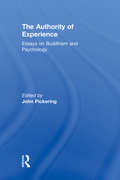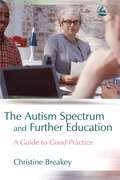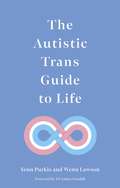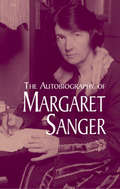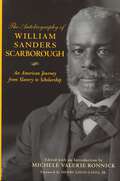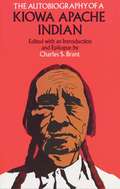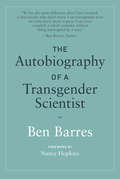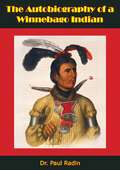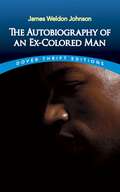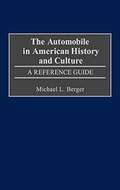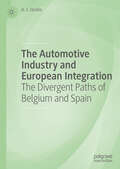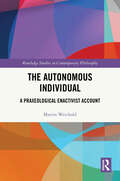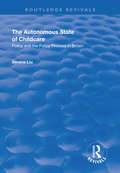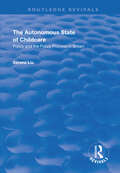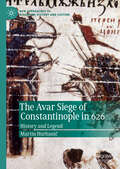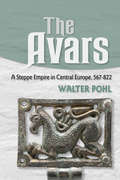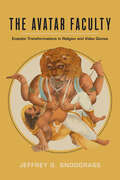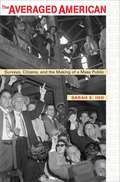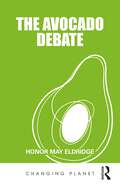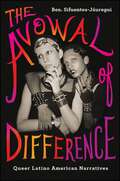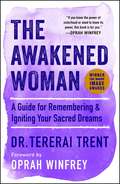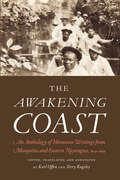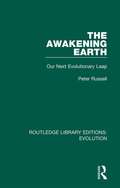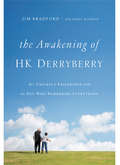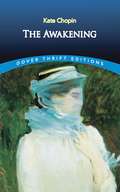- Table View
- List View
The Authority of Experience: Readings on Buddhism and Psychology
by John PickeringThis collection of writings presents contemporary views on the integration of Buddhism in the West. Over the past few decades Buddhism has deepened its presence in the West and as a result teachings and practices are becoming integrated with those of Western psychology in a more productive way. The decline of mechanism and positivism offers new opportunities to bring together Western Buddhist views of the mind and its relationship to its surroundings. Written by psychologists and scholars, the essays discuss many of the difficult questions raised by Buddhism’s increased presence. In particular the issue of the balance between authenticity and accessibility is examined. Buddhist traditions are often perceived as inaccessible and too firmly fixed to a cultural framework with some people, especially women, left feeling alienated and undervalued. However, by responding to this by attempting to synthesise Buddhism with the values of contemporary culture can lead to doubts about authenticity and dilution. Examining these issues and many more, the contributors seek to bring Buddhism into a realistic and informed relationship with contemporary Western thought.
The Autism Spectrum and Further Education: A Guide to Good Practice
by Christine BreakeyThis guide for professionals working with students with autism spectrum conditions (ASCs) in further education meets the increasing demand for information and support on this subject. Christine Breakey provides useful guidelines and practical advice on teaching young adults successfully and confidently, emphasising the development of resources and practical skills for use specifically in FE colleges. The author covers all the key areas and offers strategies and solutions for communicating effectively, helping students to manage transition, and understanding and minimising the causes of ASC behaviours as well as teaching social skills and ASC self-awareness. The Autism Spectrum and Further Education will be a vital resource for professionals in FE institutions who have to meet the needs of young adults with ASCs.
The Autistic Trans Guide to Life
by Wenn B. Lawson Yenn PurkisThis essential survival guide gives autistic trans and/or non-binary adults all the tools and strategies they need to live as their very best self.Blending personal accounts with evidence-based insights and up-to-date information, and written from a perspective of empowerment and self-acceptance, the book promotes pride, strength and authenticity, covering topics including self-advocacy, mental health and camouflaging and masking as well as key moments in life such as coming out or transitioning socially and/or physically. Written by two leading autistic trans activists, this book honestly charts what life is like as an autistic trans person and is vital, life-affirming reading.
The Autobiography of Margaret Sanger
by Margaret SangerWhile working as a nurse amid the squalor of New York's Lower East Side in the early twentieth century, Margaret Sanger witnessed the devastating effects of unwanted pregnancies. Women already overwhelmed by the burdens of poverty had no recourse; their doctors were either ignorant of effective methods of birth control or were unwilling to risk defying the law.Sanger resolved to dedicate her life to establishing birth control as a basic human right. Her battles brought a world of troubles — arrest, indictment, and exile among them — but ultimately she triumphed, opening the first American birth control clinic in 1916 and serving as the first president of the International Planned Parenthood Federation in 1953.A fascinating firsthand account of an early crusade for women's healthcare, this autobiography is a classic of women's studies and social reform.
The Autobiography of William Sanders Scarborough: An American Journey from Slavery to Scholarship (African American Life Series)
by William Sanders ScarboroughThis illuminating autobiography traces Scarborough?s path out of slavery in Macon, Georgia, to a prolific scholarly career that culminated with his presidency of Wilberforce University. Despite the racism he met as he struggled to establish a place in higher education for African Americans, Scarborough was an exemplary scholar, particularly in the field of classical studies. He was the first African American member of the Modern Language Association, a forty-four-year member of the American Philological Association, and a true champion of higher education. Scarborough advocated the reading, writing, and teaching of liberal arts at a time when illiteracy was rampant due to slavery?s legacy, white supremacists were dismissing the intellectual capability of blacks, and Booker T. Washington was urging African Americans to focus on industrial skills and training. The Autobiography of William Sanders Scarborough is a valuable historical record of the life and work of a pioneer who helped formalize the intellectual tradition of the black scholar. Michele Valerie Ronnick contextualizes Scarborough?s narrative through extensive notes and by exploring a wide variety of sources such as census records, church registries, period newspapers, and military and university records. This book is indispensable to anyone interested in the history of intellectual endeavor in America, Africana studies and classical studies, in particular, as well as those familiar with the associations and institutions that welcomed and valued Scarborough.
The Autobiography of a Kiowa Apache Indian (Native American)
by Charles S. BrantThis exciting autobiography of Jim Whitewolf, a Kiowa Apache born in the second half of the 19th-century, offers an excellent inside-look at Indian culture. An ethnological classic, it details childhood, tribal customs, contact with whites, government attitudes toward tribe, much more. Preface. Introduction & Epilogue. Index. 1 map.
The Autobiography of a Transgender Scientist (The\mit Press Ser.)
by Ben BarresA leading scientist describes his life, his gender transition, his scientific work, and his advocacy for gender equality in science.Ben Barres was known for his groundbreaking scientific work and for his groundbreaking advocacy for gender equality in science. In this book, completed shortly before his death from pancreatic cancer in December 2017, Barres (born in 1954) describes a life full of remarkable accomplishments—from his childhood as a precocious math and science whiz to his experiences as a female student at MIT in the 1970s to his female-to-male transition in his forties, to his scientific work and role as teacher and mentor at Stanford. Barres recounts his early life—his interest in science, first manifested as a fascination with the mad scientist in Superman; his academic successes; and his gender confusion. Barres felt even as a very young child that he was assigned the wrong gender. After years of being acutely uncomfortable in his own skin, Barres transitioned from female to male. He reports he felt nothing but relief on becoming his true self. He was proud to be a role model for transgender scientists.As an undergraduate at MIT, Barres experienced discrimination, but it was after transitioning that he realized how differently male and female scientists are treated. He became an advocate for gender equality in science, and later in life responded pointedly to Larry Summers's speculation that women were innately unsuited to be scientists. Privileged white men, Barres writes, “miss the basic point that in the face of negative stereotyping, talented women will not be recognized.” At Stanford, Barres made important discoveries about glia, the most numerous cells in the brain, and he describes some of his work. “The most rewarding part of his job,” however, was mentoring young scientists. That, and his advocacy for women and transgender scientists, ensures his legacy.
The Autobiography of a Winnebago Indian
by Dr Paul RadinSam Blowsnake (S.B.) was a member of the Winnebago tribe. In this autobiography, translated into English by Dr. Paul Radin, Crashing Thunder describes the life, ways, acculturation, and the peyote cult of his people. He tells about his brother-in-law the shaman, adolescence, initiation into the Medicine Dance, marriage and sexual proximity, entry into the white man’s world, traveling with a circus, alcoholism, desire to count coup, the ensuing murder of a Pottawattomie, trial and jail, and his release on a technicality.
The Autobiography of an Ex-Colored Man: The Autobiography Of An Ex-colored Man (Dover Thrift Editions)
by James Weldon JohnsonOne of the most prominent African-Americans of his time, James Weldon Johnson (1871-1938) was a successful lawyer, educator, social reformer, songwriter, and critic. But it was as a poet and novelist that he achieved lasting fame. Among his most famous works, The Autobiography of an Ex-Colored Man in many ways parallels Johnson's own remarkable life. First published in 1912, the novel relates, through an anonymous narrator, events in the life of an American of mixed ethnicity whose exceptional abilities and ambiguous appearance allow him unusual social mobility -- from the rural South to the urban North and eventually to Europe. A radical departure from earlier books by black authors, this pioneering work not only probes the psychological aspects of "passing for white" but also examines the American caste and class system. The human drama is powerful and revealing -- from the narrator's persistent battles with personal demons to his firsthand observations of a Southern lynching and the mingling of races in New York's bohemian atmosphere at the turn of the century. Revolutionary for its time, the Autobiography remains both an unrivaled example of black expression and a major contribution to American literature.
The Automobile in American History and Culture: A Reference Guide (American Popular Culture)
by Michael L. BergerThis comprehensive reference guide reviews the literature concerning the impact of the automobile on American social, economic, and political history. Covering the complete history of the automobile to date, twelve chapters of bibliographic essays describe the important works in a series of related topics and provide broad thematic contexts. This work includes general histories of the automobile, the industry it spawned and labor-management relations, as well as biographies of famous automotive personalities. Focusing on books concerned with various social aspects, chapters discuss such issues as the car's influence on family life, youth, women, the elderly, minorities, literature, and leisure and recreation. Berger has also included works that investigate the government's role in aiding and regulating the automobile, with sections on roads and highways, safety, and pollution. The guide concludes with an overview of reference works and periodicals in the field and a description of selected research collections. <p><p> The Automobile in American History and Culture provides a resource with which to examine the entire field and its structure. Popular culture scholars and enthusiasts involved in automotive research will appreciate the extensive scope of this reference. Cross-referenced throughout, it will serve as a valuable research tool.
The Automotive Industry and European Integration: The Divergent Paths of Belgium and Spain
by A. J. JacobsThis book chronicles the divergent growth trends in car production in Belgium and Spain. It delves into how European integration, high wages, and the demise of GM and Ford led to plant closings in Belgium. Next, it investigates how lower wages and the expansion strategies of Western European automakers stimulated expansion in the Spanish auto industry. Finally, it offers three alternate scenarios regarding how further EU expansion and Brexit may potentially reshape the geographic footprint of European car production over the next ten years. In sum, this book utilizes history to help expand the knowledge of scholars and policymakers regarding how European integration and Brexit may impact future auto industry investment for all EU nations.
The Autonomous Individual: A Praxeological Enactivist Account (Routledge Studies in Contemporary Philosophy)
by Martin WeicholdThis book advances a new theory of what it means to be an autonomous individual with free will and an authentic self. It synthesizes the new “action turn” from 4E cognitive science with the new “practice turn” from the social sciences to develop a new perspective on our self-interpretation as autonomous individuals.Our entire life is built upon one central foundation: the idea that we human beings are autonomous individuals. While this idea is presupposed in some academic fields, such as law and moral philosophy, it is challenged or denied in others. This book aims to move beyond debates about whether free will exists. Instead, it proposes that the idea that human beings are autonomous individuals is a culturally developed self-interpretation that is permanently enacted in social practices. Parts of it describe biological reality correctly, parts are social reality, and parts are mere fictions. This view – which the author calls "praxeological enactivism" – combines work from enactive cognitive science with practice theory from the social sciences. The book concludes by discussing the ethical advantages and dangers of the idea of the autonomous individual.The Autonomous Individual will appeal to philosophers working on free will and autonomy, moral philosophy, and philosophy of social sciences, as well as scholars and advanced students in disciplines such as cognitive science, sociology, cultural theory, and philosophical anthropology.
The Autonomous State of Childcare: Policy and the Policy Process in Britain (Routledge Revivals)
by Serena LiuThis title was first published in 2001. Public childcare provision in Britain is an issue that raises much passion and has been the source of much disappointment. Free childcare in Britain is limited. Public policy has been slow to change in terms of providing more childcare. Insufficient public childcare provision is a barrier to acheiving equal rights for women, especially within the employment sector. This book sets out to search for the factors crucial to constraining the development of childcare policy and public childcare provision. It looks at schemes that have been set up but that ultimately fail in allowing women to work by not providing the necessary childcare provision. The book looks at the issue of childcare provision, how the policy process works, the different types of childcare provision past and present, and implementation and operation of childcare schemes.
The Autonomous State of Childcare: Policy and the Policy Process in Britain (Routledge Revivals)
by Serena LiuThis title was first published in 2001. Public childcare provision in Britain is an issue that raises much passion and has been the source of much disappointment. Free childcare in Britain is limited. Public policy has been slow to change in terms of providing more childcare. Insufficient public childcare provision is a barrier to acheiving equal rights for women, especially within the employment sector. This book sets out to search for the factors crucial to constraining the development of childcare policy and public childcare provision. It looks at schemes that have been set up but that ultimately fail in allowing women to work by not providing the necessary childcare provision. The book looks at the issue of childcare provision, how the policy process works, the different types of childcare provision past and present, and implementation and operation of childcare schemes.
The Avar Siege of Constantinople in 626: History and Legend (New Approaches to Byzantine History and Culture)
by Martin HurbaničThis book examines the Avar siege of Constantinople in 626, one of the most significant events of the seventh century, and the impact and repercussions this had on the political, military, economic and religious structures of the Byzantine Empire. The siege put an end to the power politics and hegemony of the Avars in South East Europe and was the first attempt to destroy Constantinople, the capital of the Eastern Roman Empire. Besides the far-reaching military factors, the siege had deeper ideological effects on the mentality of the inhabitants of the Empire, and it helped establish Constantinople as the spiritual centre of eastern Christianity protected by God and his Mother. Martin Hurbanič discusses, from a chronological and thematic perspective, the process through which the historical siege was transformed into a timeless myth, and examines the various aspects which make the event a unique historical moment in the history of mankind – a moment in which the modern story overlaps with the legend with far-reaching effects, not only in the Byzantine Empire but also in other European countries.
The Avars: A Steppe Empire in Central Europe, 567–822
by Walter PohlThe Avars arrived in Europe from the Central Asian steppes in the mid-sixth century CE and dominated much of Central and Eastern Europe for almost 250 years. Fierce warriors and canny power brokers, the Avars were more influential and durable than Attila's Huns, yet have remained hidden in history. Walter Pohl's epic narrative, translated into English for the first time, restores them to their rightful place in the story of early medieval Europe.The Avars offers a comprehensive overview of their history, tracing the Avars from the construction of their steppe empire in the center of Europe; their wars and alliances with the Byzantines, Slavs, Lombards, and others; their apex as the first so-called barbarian power to besiege Constantinople (in 626); to their fall under the Frankish armies of Charlemagne and subsequent disappearance as a distinct cultural group. Pohl uncovers the secrets of their society, synthesizing the rich archaeological record recovered from more than 60,000 graves of the period, as well as accounts of the Avars by Byzantine and other chroniclers.In recovering the story of the fascinating encounter between Eurasian nomads who established an empire in the heart of Europe and the post-Roman Christian cultures of Europe, this book provides a new perspective on the origins of medieval Europe itself.
The Avatar Faculty: Ecstatic Transformations in Religion and Video Games (Ethnographic Studies in Subjectivity #16)
by Jeffrey G. SnodgrassThe Avatar Faculty creatively examines the parallels between spiritual and digital activities to explore the roles that symbolic second selves—avatars—can play in our lives. The use of avatars can allow for what anthropologists call ecstasy, from the Greek ekstasis, meaning "standing outside oneself." The archaic techniques of promoting spiritual ecstasy, which remain central to religious healing traditions around the world, now also have contemporary analogues in virtual worlds found on the internet. In this innovative book, Jeffrey G. Snodgrass argues that avatars allow for the ecstatic projection of consciousness into alternate realities, potentially providing both the spiritually possessed and gamers access to superior secondary identities with elevated social standing. Even if only temporary, self-transformations of these kinds can help reduce psychosocial stress and positively improve health and well-being.
The Averaged American: Surveys, Citizens, and the Making of a Mass Public
by Sarah E. Igosupports the death penalty, that half of all marriages end in divorce, and that four out of five prefer a particular brand of toothpaste. But remarkably, such data--now woven into our social fabric--became common currency only in the last century. With a bold and sophisticated analysis, Sarah Igo demonstrates the power of scientific surveys to shape Americans' sense of themselves as individuals, members of communities, and citizens of a nation.
The Avocado Debate (Changing Planet)
by Honor May EldridgeWhether smashed on toast or hailed as a superfood, the avocado has taken the world by storm, but what are the environmental and social impacts of this trendy fruit? This book does not seek to demonise the avocado and its many enthusiasts. Instead, it will illuminate consumers on the often unseen impacts of foods. A staple of cafes, restaurants, homes, and social media channels, demand for the avocado has grown exponentially over the past thirty years. From an everyday crop in South and Central America to a global phenomenon, this drastic change in demand has many consequences for people and the planet. As demand grows, so does the need for more land, with land clearances threatening habitats and biodiversity. As production grows, so does global distribution and the impacts that air and sea travel have on the environment. The shift from a local to a global product disturbs the local food system, raising serious questions around food sovereignty and food justice and the importance of establishing an agricultural system that is both environmentally and socially just. While focusing here on the avocado, this book allows readers to gain a better understanding of the food system as a whole. In doing so, it empowers us all to think carefully and critically about the environmental and ethical implications of our food choices more broadly. We shouldn’t feel guilty about eating avocados, we should simply understand the impact of doing so. This book is essential reading for all who are interested in learning more about the food system, sustainable diets, and the relationship between farming and the environment.
The Avowal of Difference: Queer Latino American Narratives (SUNY series, Genders in the Global South)
by Ben. Sifuentes-JáureguiThe Avowal of Difference explores the potentialities and limitations that queer theory offers in the context of Latino American texts and subjects. Ben. Sifuentes-Jáuregui contrasts Latino American sexual genealogies with the Anglo-European "coming out" narrative—and interrogates the centrality of the "coming out" story as the regulating metaphor for gay, lesbian, or queer identities. In its place, the book looks at other strategies—from silence to circumlocution, from disavowal to indifference—to theorize queer subject formation in a Latino American cultural context. The analysis of texts by José Lezama Lima, Luis Zapata, Manuel Puig, Severo Sarduy, Junot Díaz, and others offers a comparative approach to understanding how queer sexualities are shaped and written in other cultural contexts.
The Awakened Woman: Remembering & Reigniting Our Sacred Dreams
by Oprah Winfrey Tererai TrentThrough one incredible woman’s journey from a child bride in a small Zimbabwe village to one of the world’s most recognizable voices in women’s empowerment and education, this manifesto inspires women to pursue their sacred dreams through nine essential lessons brought forth from ancient African wisdom.Before Tererai Trent landed on Oprah’s stage as her “favorite guest of all time,” she was a woman with a forgotten dream. As a young girl in a cattle-herding village in Zimbabwe, she dreamed of receiving an education but instead was married young and by eighteen, without a high school graduation, she was already a mother of three. Tererai encountered a visiting American woman who assured her that anything was possible, reawakening her sacred dream. Tererai planted her dreams deep in the earth and prayed they would grow. They did, and now not only has she earned her PhD but she has also built schools for girls in Zimbabwe, with funding from Oprah. The Awakened Woman: Remembering & Reigniting Our Sacred Dreams is her accessible, intimate, and evocative guide that teaches nine essential lessons to encourage all women to reexamine their dreams and uncover the power hidden within them—power that can recreate our world for the better. Tererai points out that there is a massive, untapped, global resource in women who have, for one reason or another, set aside their wisdom, their skills, and their dreams in order to take care of the personal business of their lives. Not only is this a type of invisible suffering experienced by countless women, this rich resource is a secret weapon for improving our world. Women have the capacity to inspire, to create, to transform—and Tererai’s call to action will awaken hearts, give permission to recapture dreams, and provide the tools to forge a brighter path for all. This is the movement of Sacred Sisters.
The Awakening Coast: An Anthology of Moravian Writings from Mosquitia and Eastern Nicaragua, 1849-1899
by Terry Rugeley Karl OffenThe indigenous and Creole inhabitants (Mosquitians of African descent) of the Mosquito Reserve in present-day Nicaragua underwent a key transformation when two Moravian missionaries arrived in 1849. Within a few short generations, the new faith became so firmly established there that eastern Nicaragua to this day remains one of the world’s strongest Moravian enclaves. The Awakening Coast offers the first comprehensive English-language selection of the writings of the multinational missionaries who established the Moravian faith among the indigenous and Afro-descendant populations through the turbulent years of the Great Awakening of 1881 to 1882, when converts flocked to the church and the mission’s membership more than doubled. The anthology tracks the intersection of religious, political, and economic forces that led to this dynamic religious shift and illustrates how the mission’s first fifty years turned a relatively obscure branch of Protestantism into the most important political and spiritual institution in the region by contextualizing the Great Awakening, Protestant evangelism, and indigenous identity during this time of dramatic social change.
The Awakening Earth: Our Next Evolutionary Leap (Routledge Library Editions: Evolution #11)
by Peter RussellOriginally published in 1982 The Awakening Earth explores the idea of the Earth as a collective, self-regulatory living organism, and considers in this context, the function of the human race. The book provides an exploration of humanity’s potential and explores the possibility of mankind’s evolutionary future. Drawing on the work of physicists, psychologists, philosophers and mystics, the book argues that humanity is on the verge of another evolutionary leap and explores evolution in the context of spiritual growth, arguing that widespread inner awakenings could lead to a more analogous society, functioning as a single social super-organism, much in the way cells in a body function as a biological organism.
The Awakening of HK Derryberry: My Unlikely Friendship with the Boy Who Remembers Everything
by Andy Hardin Jim BradfordThe Awakening of HK Derryberry is the inspiring story of how one man was willing to step out of his upper middle-class world into the life of a young, disabled boy with a dismal future. Little did Jim Bradford know the transformational potential of that friendship--for HK and himself. HK Derryberry came into the world with the odds stacked heavily against him. He was taken from his unmarried mother's womb three months prematurely when she was killed in a car wreck. After ninety-six days of seesawing between life and death, HK's grandmother took him home. One Saturday morning Jim Bradford, a successful businessman in his mid-fifties, happens into Mrs. Winner's Chicken and Biscuits and sees a nine-year-old's head pressed down against a black plastic boom box with a crooked antenna and three strips of silver duct tape stretched across the battery cover. He can't help but notice the long, white plastic braces on each of the child's legs. Mr. Bradford learns that HK's grandmother is forced to bring him to the fast-food restaurant where she works, leaving him to sit alone all day at a small table, with only his boom box for company. On subsequent Saturdays Jim feels drawn back to the restaurant to meet with HK and begins spending every weekend with him. Eventually it becomes apparent that buried beneath HK's severe disabilities is one spectacular ability. He is diagnosed with Highly Superior Autobiographical Memory (HSAM), which involves superlative powers of recollection that enable him to remember everything that has happened to him since the age of three. Less than one hundred people have been diagnosed with HSAM, but none of them have the physical disabilities of HK Derryberry.
The Awakening: Spotlight Edition (Dover Thrift Study Editions)
by Kate ChopinWhen first published in 1899, The Awakening shocked readers with its honest treatment of female marital infidelity. <P><P>Audiences accustomed to the pieties of late Victorian romantic fiction were taken aback by Chopin's daring portrayal of a woman trapped in a stifling marriage, who seeks and finds passionate physical love outside the straitened confines of her domestic situation. <P>Aside from its unusually frank treatment of a then-controversial subject, the novel is widely admired today for its literary qualities. Edmund Wilson characterized it as a work "quite uninhibited and beautifully written, which anticipates D. H. Lawrence in its treatment of infidelity." <P>Although the theme of marital infidelity no longer shocks, few novels have plumbed the psychology of a woman involved in an illicit relationship with the perception, artistry, and honesty that Kate Chopin brought to The Awakening. <P>Now available in this inexpensive edition, it offers a powerful and provocative reading experience to modern readers.
